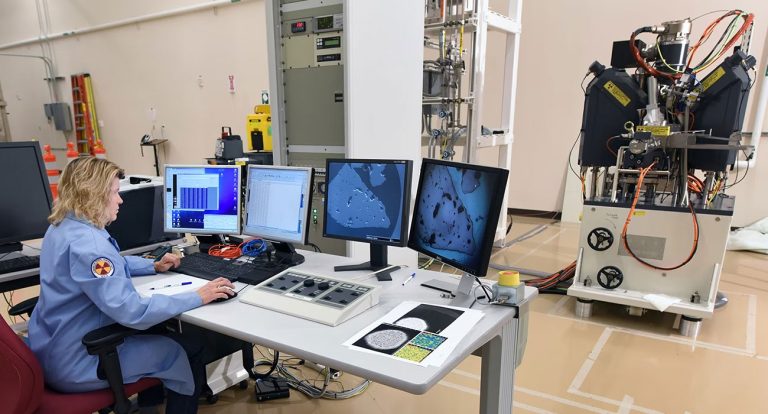Advanced Nuclear Fuels
Next-generation nuclear reactor fuels are designed to be more efficient and exhibit accident tolerant characteristics. To test and confirm such assumptions, INL scientists are working with collaborators around the world.
INL has led a fundamental shift in how nuclear energy research and development is approached. Lab scientists integrate fundamental research, modeling and simulation, small-scale experimentation and larger scale demonstrations, which are coordinated with industrial and international partners.
Capabilities and Programs
New Fuel Concepts
INL scientists are researching nuclear fuels that are more tolerant to accident conditions, utilize energy resources more efficiently or leave fewer long-lived waste isotopes behind. For example, tristructural isotropic (TRISO) fuel has several layers of carbon and carbide that serve as the primary containment for radioactive material. INL scientists led work setting a global performance record for the fuel (19 percent uranium use) , and demonstrating that it can withstand extreme temperatures (1,800 degrees C).
- TRISO Fuel Development and Qualification
- ANEEL fuel testing
- High-burnup fuel testing
- HALEU production
- Thermal testing capabilities
- Transient testing capabilities
- Materials and Fuels Complex capabilities
Molten Salt Reactors
Molten salts are a diverse group of fluids that can be used for a variety of applications, including nuclear fuels and coolants, purification and separation of chemical species, and energy storage. INL is studying and solving complex issues associated with advanced energy production and used fuel management for effectively and safely deploying future energy solutions.

Fusion Safety Program
Thermonuclear fusion powers the Sun and the stars and is the most powerful energy source known. Harnessing this power on Earth will benefit mankind for ages to come. Its energy would be cleaner, more secure and more economical than any of today’s power sources. INL has been involved in fusion research for over 30 years in support of the Department of Energy’s (DOE) mission of seeking clean, safe and economic fusion energy. The INL’s Fusion Safety Program (FSP) is the Office of Fusion Energy Science’s (OFES’s) Lead Laboratory for Magnetic Fusion Energy (MFE) Safety. In this role, the FSP pursues a safety research program that maintains several core competencies. For details, visit the Fusion Safety Program website:


